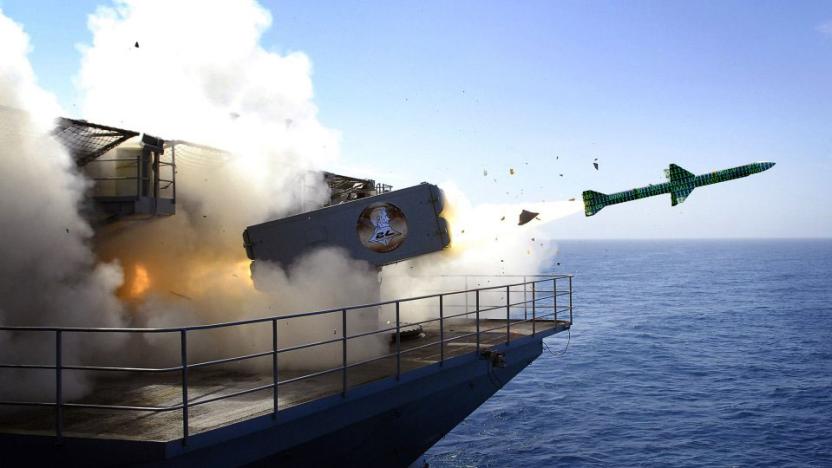cyber attacks
Latest

FCC to probe domestic Russian-owned media and telecom companies
It would reportedly focus especially on companies deemed a “security risk” to the United States.

Auction for a laptop full of malware closes at $1.3 million (updated)
Today, bidding on a laptop packed with some of the world's most dangerous malware closed at $1.345 million. Dubbed "The Persistence of Chaos," the Samsung NC10 contains six viruses that have caused an estimated $95 billion in damages. Despite what you might think, it's not meant to be a tool for any world domination scheme. It's intended strictly as an art piece -- though it could be used for academic purposes -- and it's currently isolated and air-gapped to prevent foul play.

EU approves cyber-attack sanctions ahead of election
The European Union has agreed to an automatic set of sanctions to punish any future cyber attackers. Just a week ahead of the EU Parliament elections, officials in Brussels on Friday approved a cyber sanctions regime that would impose asset freezes and travel bans on individuals. While no specific targets have been named yet, the EU hopes the new system will make it easier for the 28 member nations to act quickly in the event of a cyber attack.

The US Navy is taking cyber warfare to the enemy
The US Navy will soon operate as a cyber warfighting platform, ready to attack rogue nations when ordered by the White House. A top military commander tipped the initiative at a defense conference, saying "you don't win a knife fight without swinging a knife." US intelligence services already launch limited cyber strikes, as they did against North Korea following the Sony hacking incident. But assigning such attacks to a military arm is a signal that the US wants a stronger deterrent against hacking aggression from China, Russia and other nations. There's no word on whether the Navy's new role is part of the new US Cyber Threat Intelligence Integration Center initiative.

Wall Street wants more government help to combat cyber attacks
Wall Street is worried. Not about government regulation or investigations by law enforcement agencies. No, the countries financial institutions are concerned about cyber attacks. The Securities Industry and Financial Markets Association, or SIFMA, has proposed that it and the government join forces in an effort to combat the 21st century threat. As Wall Street's biggest trade group, the organization already wields plenty of influence, but to help convince the American government it has hired former NSA director Keith Alexander.

Prosecutors laugh last, Lulzsec hackers sentenced
The Lulzsec hackers responsible for a string of 2011 cyber attacks that targeted game companies including Sony, Nintendo, Epic, Bethesda, and Mojang have been sentenced to jail time. Gamespot reports that Ryan Cleary, Jake Davis, Mustafa al-Bassam, and Ryan Ackroyd pled guilty last month. The BBC says that the men could also face extradition to the United States due to various indictments. Lulzsec targeted a number of high profile corporations during the summer of 2011. The attacks resulted in Sony Online Entertainment MMOs and Sony's PlayStation Network going offline for several weeks.

Kaspersky Labs preps its own OS to guard vital industry against cyberwarfare
Kaspersky Labs' namesake Eugene Kaspersky is worried that widely distributed and potentially state-sponsored malware like Flame and Stuxnet pose dire threats to often lightly protected infrastructure like communication and power plants -- whatever your nationality, it's clearly bad for the civilian population of a given country to suffer even collateral damage from cyberattacks. To minimize future chaos and literally keep the trains running, Kaspersky and his company are expanding their ambitions beyond mere antivirus software to build their own, extra-secure operating system just for large-scale industry. The platform depends on a custom, minimalist core that refuses to run any software that isn't baked in and has no code outside of its main purposes: there'll be no water supply shutdowns after the night watch plays Solitaire from an infected drive. Any information shared from one of these systems should be completely trustworthy, Kaspersky says. He doesn't have details as to when the OS will reach behind-the-scenes hardware, but he stresses that this is definitely not an open-source project: some parts of the OS will always remain confidential to keep ne'er-do-well terrorists (and governments) from undermining the technology we often take for granted.

Iran claims to have been hit by 'heavy' cyber attack, pins slowdowns on coordinated hacking campaign
Whatever you think of Iran's politics, it's hard to deny that the country has frequently been the target of internet-based attacks that sometimes go beyond the originator's plans. If you believe High Council of Cyberspace secretary Mehdi Akhavan Behabadi, the pressure is only getting worse. He tells Iranian media that the nation is under "constant" digital bombardment and was just hit with a major assault on Tuesday that bogged down local internet access. Behabadi unsurprisingly contends that the attacks are deliberate efforts to undermine Iran's data, nuclear and oil infrastructures, with a finger implicitly pointed westward. While it's no secret that the country's enemies want to slow down what they see as a rush towards nuclear weapons, it's difficult to know how much of the accusation is serious versus bluster: we've seen individual smartphone users who consume more than the "several gigabytes" of traffic that reportedly caused national chaos in the most recent incident. No matter the exact nature, it's likely that residents stand to lose as Iran fences off the internet to keep outside influences, hostile and otherwise, from getting in. [Image credit: Amir1140, Wikipedia]

Water pump reportedly destroyed by SCADA hackers
The FBI and DHS are investigating damage to a public water system in Springfield, Illinois, which may have been the target of a foreign cyber attack. There's no threat to public safety and criminal interference has not been officially confirmed, but a security researcher called Joe Weiss has reported evidence that hackers based in Russia are to blame. He claims they accessed the water plant's SCADA online control system and used it to repeatedly switch a pump on and off, eventually causing it to burn out. Coincidentally, a water treatment facility was publicly hacked at the Black Hat conference back in August, precisely to highlight this type of vulnerability. If there are any SCADA administrators out there who haven't already replaced their '1234' and 'admin' passwords, then they might consider this a reminder.

SOCOM cheater convicted in grand jury investigation for crashing Sony's site
There's a few valuable life lessons in the following story, so pay attention: A Pittsburgh news station recently reported on a 17-year-old boy who was disqualified from a SOCOM U.S. Navy Seals tournament after it was discovered he was cheating. In retaliation, the young man hacked into the official PlayStation site, and crashed it for 11 days back in 2008. Sony re-retaliated by opening up a federal grand jury investigation into the "cyber attack," which led back to the aforementioned boy, who is now in a whole heap of trouble. The teen pleaded guilty, and was convicted on four felony charges: Unlawful use of a computer, criminal use of a computer, computer trespassing and the distribution of a computer virus. He'll be sentenced later this year. The moral of the story? Don't cheat while playing online games, and don't crash the web sites of gigantic corporate entities. If caught, you could end up being branded a cheater. Or, you know, a felon. [Via Kotaku]

Director of National Intelligence says major cyber attack could wreak havoc on the U.S. of A.
Director of National Intelligence Dennis Blair told the National Intelligence Committee that the United States is at risk of a "crippling" cyber-attack, and without the proper tools to defend against such an attack. Blair counseled the US to "deal with that reality," saying that catastrophic consequences would result if it did not deal with said reality. Specific problem areas he cited include the fact that more and more, foreign companies supply both the hardware and software for private businesses. Blair also noted the fact that the net has served as a breeding ground for "homegrown radicalism." You don't say? Hit the source link a fuller detail of yesterday's proceedings.

Mysterious cyber-attacker hits at federal websites, crisis averted?
It looks like a nefarious cyber-attack which affected several federal websites in the United States was a little more far-reaching than initially thought. The attack -- which started on the 4th of July -- targeted websites in both South Korea and the United States, including the Treasury Department, Federal Trade Commission and Secret Service. Various problems were still being reported days later, and while there's no official word on who the attackers were, those "people familiar with the matter" we know and love seem to be pointing their fingers at North Korea. So far as we know, no irreparable damage has been done, but we're not sure anyone would tell us if it had.







